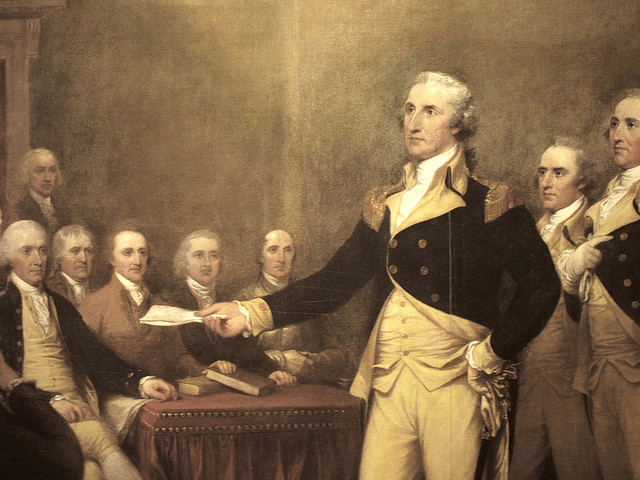On Quora someone asked, “should answers be categorized by expert / non-expert?”
My response:
There is no such thing as an expert. @jaltucher (Click to Tweet!)
First, a couple of anecdotes.
In 1799, George Washington caught a cold. He was coughing and he had a fever.
This was considered an emergency. The greatest American alive was sick!
Blood was considered the dominant force in the body for about 2000 years before this. So if someone was sick, something in the blood needed to be purged.
Hence, the bloodletting. I don’t know if leeches were involved.
George Washington died the next day. Not from a cold. From shock. Too much blood.
In 1981, just thirty-three years ago, Bill Gates said, “There is no need for anyone to have a computer in their home.”
Nobody knows what 97% of the universe is made of (physicists call it either “dark energy” or “dark matter” but there is not a single testable theory of what that is).
Here’s an important story for investors. About a decade ago a company called Odeo was started in order to build a platform for podcasting.
Two of the programmers developed a side project. The side project showed a tiny bit of traction. 10,000 people signed up. Less than the number of people who will read this post.
The CEO was getting frustrated with the podcasting platform. Nobody was signing up.
So he made an offer to all of the investors. The investors were some of the most prestigious and sophisticated investors in Silicon Valley and the CEO was a seasoned professional.
He said they were going to focus on the side project BUT if anybody wanted their money back, he would personally buy their investment back at cost. Nobody would make any money but nobody would lose any money.
100% of the professional investors asked for their money back.
Then the CEO renamed the company to Twitter.
Larry Page and Sergey Brin wanted to be academics. They tried to sell their company to Yahoo for $1 million. They were rejected. Then they tried to sell to Excite for $1 million. Rejection. They lowered their price to $750,000 rejection.
So they figured, Ok, let’s go for it.
In 2001 I had a chance to buy half of a company called Oingo. They were running out of cash and my VC firm was given a look. Someone came into my office and said, “we can probably pick this up for nothing.”
Oingo was basically an auction system for people to buy words on search engines.
I said, “Are you kidding me? The entire search engine business is dead.”
I was an expert. I had a $120mm venture capital fund. I’ve since written thirteen “expert” books. I go on TV to talk about how great it is to be an expert.
Oingo changed their name to Applied Semantics. Google paid 1% of the company to buy them and Applied Semantics became AdSense, which is 99% of Google’s revenues. Half the company might be worth around $500 million now or more.
I once made a bunch of websites. I wanted to build a business out of each of them. I showed one of them to my six-year-old daughter. I was very excited about it. I won’t describe what it was but she basically said, “I don’t know. It seems a bit mean to people.”
She was right. Nobody signed up. In fact, nobody wanted to sign up for any of my websites that I had built.
One time we walked up and down Main Street. She described to me which companies she thought would go out of business and why. She was basically right on all counts. I should let her invest my money.
I decided to try one more website at the time but I had my doubts. There was a lot of competition. Millions of people signed up and I sold it eight months later for $10 million.
If you divided the world between experts and non-experts, who are the experts who decide? Who watches the watchmen?
Academia can’t be the criteria. How do you know that 200 years from now you didn’t just pick this year’s version of George Washington’s bloodletters, or last decade’s version of everyone who bailed out of Twitter.
Professional experience can’t be a criteria. Bernie Madoff was head of the Nasdaq for a while and a “successful” hedge fund manager for decades. Enron, Worldcom, and AIG, were three of the most respected companies in the world before they went bankrupt or bailed out.
Does net worth make someone an expert? This is all anecdotal but I’m sure you can find people in every single field of life that are experts that don’t necessarily have a lot of money but have a lot of passion for their field.
A great example is Bill James essentially inventing the use of statistics to create a world dominating baseball team. Or Nate Silver predicting the electoral outcome in every congressional district despite having almost zero political experience and despite all the professional talking heads disagreeing with him.
Does this mean we are all idiots? I don’t know. I’m not smart enough to answer that.
But it does mean that all of us have a voice.
And then anyone can choose to listen.
James Altucher has built and sold several companies, and failed at dozens more. He’s written twelve books, and The Power of No is the book to RULE THEM ALL. (Although he is also fond of Choose Yourself.) He’s an investor in twenty different companies. He writes every day. He doesn’t have enough friends. Still interested in knowing him? Follow him on Facebook and Twitter.
Image courtesy of Joye~.












